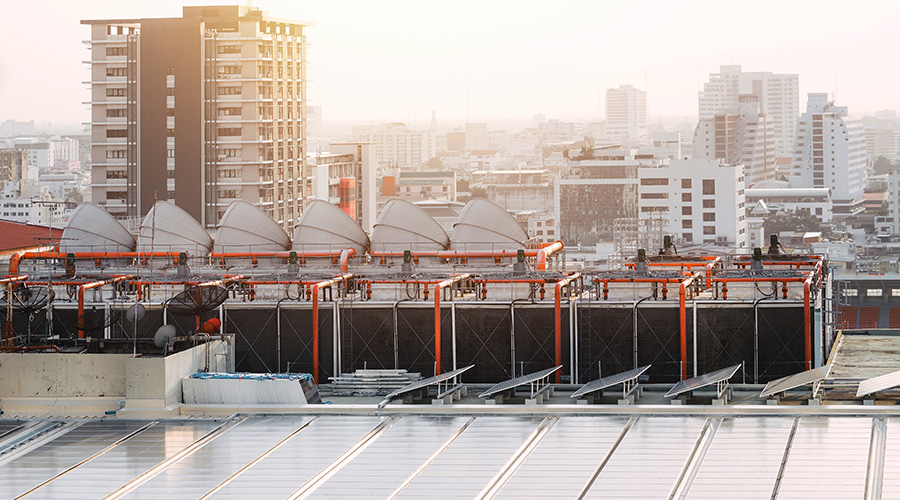How Boilers are Affecting Facilities Managers
Routine maintenance can help stave off significant issues and extend the life of systems.
By Dave Lubach, Managing Editor
Boiler systems traditionally rank among the more costly projects that maintenance and engineering managers take on over the course of their careers at institutional and commercial facilities.
With the impact of electrification and sustainability goals continuing to impact facilities across the country, ensuring that boiler systems are running as efficiently as possible is crucial to the bottom line for managers.
The American Boiler Manufacturers Association (ABMA) published a boiler maintenance schedule to help managers address proper maintenance and develop a timeline to accomplish this. Routine maintenance can help stave off significant issues and extend the life of systems.
Managing Editor Dave Lubach of the Facility Market sat down with ABMA President and CEO Scott Lynch at the recent AHR Expo, a trade show dedicated to the HVAC industry, to discuss the boiler industry and how it’s affecting maintenance and engineering managers.
FN: How valuable can regular boiler maintenance be for maintenance and engineering managers?
Lynch: A lot of times, the daily maintenance might get done, or the weekly maintenance doesn’t get done, or the quarterly maintenance doesn’t get done. There are things that if everything isn’t done, you can’t head off things that happen. Our goal with the maintenance manual was to say that there are some things you have to do on a regular basis and some things you have to do on a monthly basis. Sometimes, it’s just making sure things are going at the same level, so if you find something that’s kind of off, then you’ve got to look into that. The other thing that we try to explain to the end user is there’s a limit to your education, and when you’re beyond your limit, know it and call in an expert to come in and fix something other than to try and fix it yourself.
FN: What kind of knowledge levels of boiler systems do you see among facility managers?
Lynch: It depends on their background – have they transitioned to (boiler maintenance responsibilities) because that’s the job that has to get done and they don’t have any experience? We notice that the larger the facility, the larger the boiler room, the more sophisticated the people are running the facility. When you have a small team, and you have a guy running the boiler room and something else, he may not have the same experience, so they have to figure out where they can get that training. A lot of times they’re busy and don’t have a budget, so it can be a challenge.
FN: What trends are you seeing in the boiler industry that facility managers should be aware of?
Lynch: I think there are a lot more advances in the technology in the controls and the burner systems that actually help an end-user to monitor situations better. Older controls are not feeding as much information out so with some of these new control systems, you can pull up a report that says what’s going on and how things are going. Some of the older systems don’t have that, so managers are doing some manual operations and manual testing that the system can’t do on its own. That takes investment and takes dollars to do that, and a knowledge that there is something else out there that can help them.
FN: What kind of boiler projects are managers from institutional and commercial facilities working on?
Lynch: It’s a lot of different things. It depends on the budget, and it also depends on the goals of the end-user. A lot of our end-users have sustainability goals that the boiler system can be a solution in those goals. We have people that have converted from oil to natural gas that are now looking to go from a biomass or biodiesel, and they’re looking at electric boilers. Other times it’s a retrofit. If you have an old burner, a retrofit of a burner can pay extreme dividends. It depends on the age of the boiler and how good the boiler itself is if you retrofit a brand-new burner, but if the boiler is old, you’re not going to get the efficiency goals that you want. That's where a brand-new boiler system comes in. Sometimes it’s just because the older one can’t be saved, it’s 45 years old, and yes, you can get efficiencies, but the payback is better if you get a new one. For a hospital system, healthcare is a large customer for our industry, and some of the largest hospital systems are running very sophisticated boiler rooms.
FN: How is electrification changing the boiler industry?
Lynch: There are areas where electrification just doesn’t work. There’s still a cost for electric as well. It might feel like it’s cleaner but there’s still challenges there. Also, there are challenges if you’re converting into an electric boiler. Some changes need to occur in the system. Managers have to realize that sometimes piping changes need to take place because of whatever system was in there in the first place. We also have the dual-fuel option too. Larger facilities, especially on the industrial side, look at the dual-fuel as an option.
Dave Lubach is the managing editor of the Facilities Market. He has more than eight years of experience covering facilities management and maintenance.
Related Topics:












